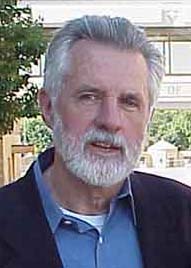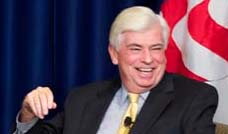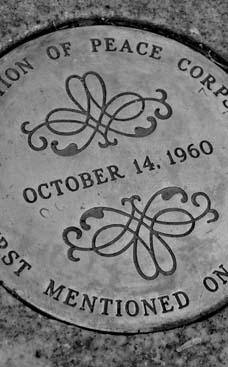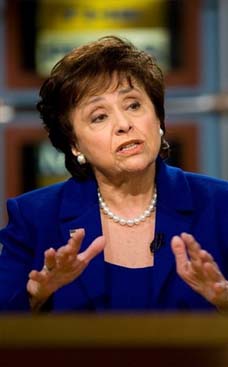
Bob Shacochis pinpoints how Peace Corps writers are in step with writers from previous generations: "We are torchbearers of a vital tradition - that of shedding light in the mythical heart of darkness. We are descendants of Joseph Conrad, Mark Twain, George Orwell, Graham Greene, Somerset Maugham, Ernest Hemingway, and scores of other men and women, expatriates and travel writers and wanderers, who have enriched our domestic literature with the spices of Cathay, who have tried to communicate the ‘exotic' as a relative, rather than an absolute, quality of humanity." What America has gained through the writings of these Volunteers are methods of understanding the parts of the world and the cultures most Americans never see. By writing about the developing world and emerging democracies, Peace Corps Writers have broadened the landscape of American literature, enriching the national cannon with internationally flavored prose and poetry. Peace Corps writers have come of age as literary persons. Peace Corps writers tell the stories of life in the developing world. It is perhaps a small claim to make in the world of literature, but it's theirs alone to make.
John Coyne writes: Peace Corps Prose: Ours Alone to Make
Peace Corps Prose: Ours Alone to Make
from Peace Corps Worldwide Master Site Feed by John Coyne
One of the unintended consequences of Peace Corps Volunteers is a library shelf of memoirs, novels, and poetry. Unlike travel writers who seek new lands to explore, and unlike anthropologists who find foreign societies puzzles to comprehend, Peace Corps Volunteers arrive, as we know, in-country with some hope that they can do some good. And many, when they come home, want to share their incomparable experiences and insights.
Peace Corps writers who have written books based on their experience include, are certainly not limited to–
* Paul Theroux (Malawi) - My Secret History;
* George Packer (Togo) - A Village of Waiting;
* Mary-Ann Tirone Smith (Cameroon) - Lament for a Silver-Eyed Woman;
* Norm Rush (Botswana)-Whites;
* Moritz Thomsen (Ecuador)-Living Poor: A Peace Corps Chronicle;
* P.F. Kluge (Micronesia) - The Edge of Paradise: America in Micronesia;
* Peter Hessler (China) - River Town;
* Tom Bissell (Uzbekistan) - Chasing the Sea;
* Maria Thomas (Ethiopia) - Come to Africa and Save Your Marriage;
* Charles Larson (Nigeria)- The Insect Colony
* Roland Merullo (Micronesia) - Leaving Losapas;
* Ann Neelon (Senegal) - Easter Vigil;
* Bob Shacochis (Eastern Caribbean)- Easy in the Islands;
* Susan Rich (Niger) - The Alchemist's Kitchen;
* Richard Wiley (Korea) - Festival for Three Thousand Maidens;
* Sarah Erdman (Cote d'Ivoire) - Nine Hills to Nambonkaha;
* Mark Jacobs (Paraguay)-A Handful of Kings
* Mark Brazaitis (Guatemala) - The River of Lost Voices;
* Kathleen Coskran (Ethiopia) - The High Price of Everything;
* Tony D'Souza (Cote d'Ivoire) - Whiteman;
* Melanie Sumner (Senegal) - Polite Society;
* Peter Chilson (Niger) - Disturbance-Loving Species;
* Margaret Szumowski (Zaire/Ethiopia) - I Want This World;
* Paul Eggers (Malaysia) - Saviors;
* Ann Panning (Philippines)-The Price of Eggs;
* Cynthia Morrison Phoel (Bulgaria);
* Robert Rosenberg (Kyrgyzstan)- This Is Not Civilization;
* Mike Tidwell, (Zaire) - Pond of Kalambayi;
* P.F. Kluge (Micronesia)-The Edge of Paradise: America in Micronesia;
* Mike Meyer (China) -The Last Days of Old Beijing;
* Marie Muller (Ecuador) - Green Fires: Assault on Eden;
* Barry Kitterman (Belize) -The Baker's Boy;
* Jan Worth (Tonga) - Night Blind;
* Eileen Drew (Zaire) - Blue Taxis: Stories About Africa;
* Sandra Meek (Botswana) -The Circumference of Arrival;
* Kris Holloway (Mali)-Monique and the Mango Rains
* Matthew Davis (Mongolia)-When Things Get Dark: A Mongolina Winter's Tale;
* Lawrence F. Lihosit (Honduras)-South of the Frontera;
* Bonnie Black (Gabon) How to Cook a Crocodile.
The Kennedy Kids in the Age of The Organization Man
While the Peace Corps is being defined today mostly in memoirs, it is noteworthy that early Peace Corps-inspired writings were mainly fictional.
During the 1950s, two societal impulses swept across America. One impulse that characterized the decade was detailed in two best-selling books of the era: the 1955 novel by Sloan Wilson, The Man in the Gray Flannel Suit, and the non-fiction book, The Organization Man, written by William H. Whyte and published in 1956. These books looked at the "American way of life" and how men got ahead in their jobs and in society. Both are bleak takes on the corporate world.
These books were underscored by Ayn Rand's ideas as expressed in such novels as Atlas Shrugged, published in 1957. Her philosophy of Objectivism proposed reason as man's only proper judge of values and his only proper guide to action. Every man, according to Rand, was an end in himself. He must work for rational self-interest, neither sacrificing himself to others nor sacrificing others to himself. Objectivism rejected any form of altruism.
Then in 1958 came the novel The Ugly American, by William Lederer and Eugene J. Burdick. This book went through fifty-five printings in two years and was a direct motivation in creating the Peace Corps according to Elizabeth Cobbs Hoffman's history of the early Peace Corps, All You Need Is Love, published by Harvard University Press in 1998.
The hero in The Ugly American is Homer Atkins, a skilled technician committed to helping at a grass-roots level by building water pumps, digging roads, and building bridges. He is called the "ugly" American only because of his grotesque physical appearance. He lives and works with the local people in Southeast Asia and, by the end of the novel, is beloved and admired by them.
As a US Senator, John F. Kennedy responded to what Lederer and Burdick had to say about the ineptitude of American foreign policy and, in January 1959 Kennedy sent a copy of The Ugly American to every member of the Senate. A year later ideas expressed in the novel would be used by his late aide, Ted Sorensen, when crafting the speech Kennedy gave on November 2, 1960, at the Cow Palace in San Francisco, six days before the presidential election. It was JFK's last major speech of the campaign, and in it Kennedy called for the establishment of a Peace Corps, using that name for the first time. America, Kennedy said in San Francisco, was "full of young people eager to serve the cause of peace in the most useful way."
A New Frontier
Kennedy's call to serve and his campaign theme of a "new frontier" appealed to the romantic impulse of many early Volunteers. While social historian Frederick Jackson Turner declared that our frontier was closed by the 1890s, America still responded to the notion of a hero, a lone hero standing up to a corrupt world. This lone hero was dramatized during the 1950s in two classic western movies, "Shane" and "High Noon." And like Alan Ladd in "Shane," Peace Corps Volunteers could, in a sense, ride off into the sunset, saddlebags packed with idealism and a yearning for adventure. And the literary types among these Volunteers could use their overseas experiences in their prose and poetry.
Writing from experience
The first book to draw on the Peace Corps experience was written by Arnold Zeitlin, who had volunteered for the Peace Corps in 1961 after having been an Associated Press reporter. That book, To the Peace Corps, With Love (1965), detailed a year of Zeitlin's life in Ghana as a PCV.
Two years later, in 1967, Simon & Schuster published An African Season, by Leonard Levitt, another journalist. This memoir covers Levitt's first year (1964) of living and teaching in a rural upper-primary school in Tanzania.
In 1969, Moritz Thomsen published what is considered by many to be the classic Peace Corps memoir: Living Poor: A Peace Corps Chronicle. Thomsen, who had a farm in the state of California, became a Peace Corps farmer in Ecuador at the age of 44, and lived out his life in that country.
Paul Theroux served in Malawi from 1963 to 1965 and used his Peace Corps material in three of his novels: Girls At Play (1969), My Secret History (1984) and My Other Life (1996).
Michael Tidwell's 1990 The Ponds of Kalambayi: An African Sojournis a passionate and resonant recounting of the author's tour as a fish extension worker in Zaire; Sara Erdman's Nine Hills to Nambonkaha tells the story of a young woman coming of age in Cote d'Ivoire and was published in 2001; Peter Hessler published River Town: Two Years on the Yangtze, in 2000, and then went on to write two other books based on his time living in China. Recently, Matthew Davis, who served in Mongolia, published When Things Get Dark: A Mongolina Winter's Tale.
Novels Inspired by the Peace Corps Experience
The first published "Peace Corps novel" was Lament for a Silver-Eyed Woman, by Mary-Ann Tirone Smith. It was published in 1988. Smith's novel was followed in 1991 by Richard Wiley's Festival for Three Thousand Maidens, a novel that Wiley built around his experience serving in the Peace Corps in Korea. Leaving Losapas by Roland Merullo, also published in 1991, was based on his tour in Micronesia. Marnie Mueller's novel, Green Fires: Assault on Eden, A Novel of the Ecuadorian Rain Forest was a 1994 novel about a PCV who returns to her host country, Ecuador, with her new husband.
Using their experiences of foreign countries and cultures as the raw material for their fiction and non-fiction, these ‘Peace Corps Writers' and their writing - by token of the subjects and themes and sensibilities present - show what a profound influence their two years of service had on how they wrote and what they wrote.
Paul Theroux, in his Introduction to Sunrise With Seamonsters: Travels & Discoveries 1964-1984, recounts how he found his creative material while volunteering in Africa. He describes the moment when he realized he had a motherlode of material thanks to the Peace Corps.
"I remember a particular day in Mozambique," Theroux wrote, "in a terrible little country town, getting a haircut from a Portuguese barber. He had come to the African bush from rural Portugal to be a barber . . .. This barber did not speak English, I did not speak Portuguese, yet when I addressed his African servant in Chinyanja, his own language, the Portuguese man said in Portuguese, ‘Ask the bwana what his Africans are like.' And that was how we held a conversation - the barber spoke Portuguese to the African, who translated it into Chinyanja for me; and I replied in Chinyanja, which the African kept translating into Portuguese for the barber. The barber kept saying - and the African kept translating - things like, ‘I can't stand the blacks - they're so stupid and bad-tempered. But there's no work for me in Portugal.' It was grotesque, it was outrageous, it was the shabbiest, darkest kind of imperialism. I could not believe my good luck. In many parts of Africa in the early 1960s it was the nineteenth century, and I was filled with the urgency to write about it."
Richard Wiley recalls from his time in Korea: "As I started to learn Korean I began to see that language skewed actual reality around, and as I got better at it I began to understand that it was possible to see everything differently. Reality is a product of language and culture, that's what I learned."
The late novelist Maria Thomas said of life in Ethiopia, "it was a great period of discovery. There was the discovery of an ancient world, an ancient culture, in which culture is so deep in people that it becomes a richness."
Poet Margaret Szumowski, who served in Zaire and Ethiopia, puts it this way:
"The visual shock and splendor of Africa is enough to keep the poet writing for the rest of her life - take as an example, the baobab. I'd never seen such a strange and magnificent tree, one that blooms at night, harbors night creatures such as lemurs, and provides food for humans from its fuzzy pods. I'd never seen donkeys in the streets laden with their loads, or a woman dancing around our house, rags tied to her feet as she cleaned the floor as in Addis Ababa. I'd never seen soldiers with their guns pointed at us, as I did in Uganda. All of these experiences gave me enough to think about and absorb for the rest of my life. "
But it is the gift of language that these poets find most useful and beneficial. Poet Ann Neelon learned a great deal from her experience in Senegal. Yet she is able to sum it up in one word: "foreignness." She wrote in an essay for the newsletter Peace Corps Writers:
"Foreignness is important to a poet because it teaches humility. Humility is important because without it there is no mystical experience. In Senegal, I gained many things useful to a poet. These included hours of direct exposure to the oral tradition via West African griots, caches of exquisite bush and desert images, and French and Wolof syllables, but none of these can compare with the opportunity to have Africa erase who I was. Only after losing myself could I find myself as a writer."
John Givens, a Volunteer in Korea, and author of three novels published in the 1980s, says that the Peace Corps "suggested that experience was not limited to the mores and expectations of central California where I grew up. The ‘wideness' of the world came home to me vividly in Korea, and I've been exploring the world ever since."
Novelist and short story writer Eileen Drew makes the point that writers with Peace Corps experience "bring the outsider's perspective, which we've learned overseas, to bear on the U.S. We are not the only writers to have done this, but because of the nature of our material, it's something we can't not do."
And finally Bob Shacochis pinpoints how Peace Corps writers are in step with writers from previous generations:
"We are torchbearers of a vital tradition - that of shedding light in the mythical heart of darkness. We are descendants of Joseph Conrad, Mark Twain, George Orwell, Graham Greene, Somerset Maugham, Ernest Hemingway, and scores of other men and women, expatriates and travel writers and wanderers, who have enriched our domestic literature with the spices of Cathay, who have tried to communicate the ‘exotic' as a relative, rather than an absolute, quality of humanity."
What America has gained through the writings of these Volunteers are methods of understanding the parts of the world and the cultures most Americans never see. By writing about the developing world and emerging democracies, Peace Corps Writers have broadened the landscape of American literature, enriching the national cannon with internationally flavored prose and poetry. Peace Corps writers have come of age as literary persons. Peace Corps writers tell the stories of life in the developing world. It is perhaps a small claim to make in the world of literature, but it's theirs alone to make.













